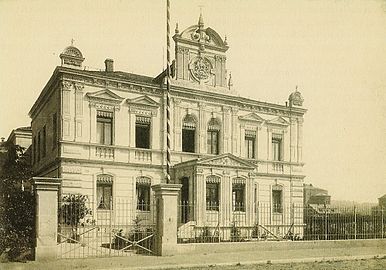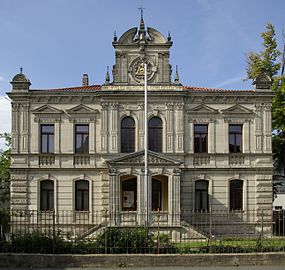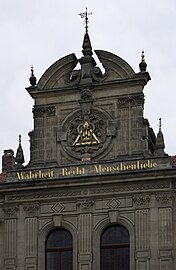Lebanon to the three cedars
The Johannisloge Lebanon zu den Drei Cedern is a humanitarian (i.e. religiously neutral ) Masonic Lodge in Erlangen and belongs to the Grand Lodge of the Old Free and Accepted Masons of Germany .
The Lebanon zu den Drei Cedern (founded in 1757, registration number 34) is the oldest existing cultural association in Erlangen and is the second oldest lodge in Bavaria after the Bayreuth Freemason Lodge Eleusis for Secrecy (founded in 1741, registration number 6).
In 2015 the Erlangen FDP awarded its “Liberal Prize” to the Erlangen Masonic Lodge for its social and cultural commitment.
Social action
Sponsorship award
The United Freemasons Lodge Lebanon zu den Drei Cedern has been awarding an annual “Prize for Humanitarian and Cultural Commitment” since 2000 to people or institutions in the region who have drawn attention to themselves through extraordinary humanitarian operations.
- 2018: Maria Yeddes from the “Grünes SOfA” association, which supports single mothers and fathers.
- 2016: Monika Petersen for her longstanding commitment on the board of the association "Voluntary Refugee Care EFIE eV"
- 2015: Förderkreis Spiel- und Lernstuben eV Erlangen, which voluntarily supports the learning rooms of the city of Erlangen in order to support disadvantaged children and young people in the socially disadvantaged areas and to accompany them on their school career.
- 2013: Elke Yassin-Radowsky for her commitment as head of the organization “Weisser Ring eV”.
- 2008: Ute Hirschfelder for the establishment and her engagement in the “Sonderfons Kinderarmut” of the “Erlangen Civic Foundation”.
benefit concert
Since 2004, the Lebanon Lodge has been organizing an annual benefit concert for the 3 Ceders in the Erlangen Logenhaus. In the last 10 years, donations have been made to the “ Special Fund for Children ” of the Erlangen Community Foundation.
history
On September 24, 1757, the Lodge Zu den drey Cedern was founded by the Bayreuth official based in Erlangen (Erlangen was the second residence of the Margraviate Brandenburg-Bayreuth ). The formal constitution patent required for this was issued by Margrave Friedrich von Brandenburg-Bayreuth in his function as Grand Master of the Bayreuth Great Mother Lodge Zur Sonne . The light (inauguration) of the lodge then took place on October 20, 1757 by installing the lodge officials through a delegation of the first officials from the Bayreuth mother lodge.
The addition to the name Lebanon first appeared on June 22, 1775 in a guest speech by Johann Friedrich Wilhelm von Metzsch, Master of the Chair of the Bayreuth Lodge . Metzsch had wished: "The lodge may stand as firm as the cedars in Lebanon"; In his honor, the word Lebanon was added to the lodge name.
In 1764 the lodge, which had previously worked according to the simple old English system , adopted the system of strict observance . The ritual work ceased from 1766 to 1773. From 1773 the lodge worked again officially and regularly according to the old English regulations.
In 1778 Duke Ferdinand von Braunschweig, as acting grandmaster of all united German lodges, raised the Alexander Lodge of Ansbach to three stars as the directorial mother lodge for Franconia on this side of the Main stream . The Lebanon zu den Drei Cedern (together with the lodges Zu den Drei Kellen in Marktsteft, and Joseph zur Einigkeit in Nürnberg) were now also subject to it .
With the sale of the Margraviate of Ansbach-Bayreuth to Prussia in 1791, Lebanon also came to the three cedars under “Berlin supervision” and, following the Royal Prussian Edict of October 20, 1798, had to submit to one of the three recognized Berlin mother lodges; she decided (together with Ansbach) for the Great National Mother Lodge "To the Three Worlds" , while the Bayreuth Mother Lodge Loge Zur Sonne joined the system of the Great Lodge of Prussia called "Royal York for Friendship" ; from then on both lodges went their separate ways.
In 1810 Erlangen and the Principality of Bayreuth became part of the Kingdom of Bavaria ; Since Lebanon wanted to continue to work with the three cedars in its now accustomed so-called rectified system with four degrees, it entered the Great Provincial Lodge Anarcharsis for a sublime purpose in Ansbach, which in 1807 received its constitutional patent from the Great National Mother Lodge “To the three worlds “ Had received.
In 1831 Lebanon switched to the three cedars at the Grand Mother Lodge of the Eclectic Freemasons' Union , in which it remained until the Grand Lodge and its daughter lodges dissolved themselves due to National Socialist pressure in 1933.
In 1875 the lodge members initiated the establishment of the first Erlangen city library with their own resources and under voluntary supervision.
After the Second World War, on December 19, 1946, former Lebanon brothers to the three Ceders founded the United Freemasons Lodge Lebanon zu den Drei Cedern together with former brothers of the second Erlangen Masonic Lodge Germania for German loyalty , which then officially opened on October 26, 1947 with a Temple work has reopened.
The Lebanon zu den Drei Cedern joined the also re-established Bayreuth Grand Lodge Zur Sonne (for Bavaria) , which in 1949 together with its member lodges became part of the United Grand Lodge of Germany , which has been the Grand Lodge of the Old Free and Accepted Masons of Germany (AFAM) since 1968 is called.
In 2011 the lodge hosted the grand lodge meeting of the grand lodge AFAM.
The Erlanger Lodge House
The first work of the lodge took place in the restaurant Brandenburger Haus in Goethestrasse, the owner of the inn, Plochmann, was the former court cook of the Bayreuth margrave and a freemason himself. As the number of brothers grew, the lodge had to keep changing rooms until it was permanently located at Universitätsstrasse 25 in 1874.
In 1890 a new box house was built because the old building acquired in 1874 had become too small. This building, a neo-Renaissance sandstone block, is one of the few lodge houses in Germany that have been preserved in their original state. It is an architectural monument recognized by the Bavarian State Office for the Preservation of Monuments .
The following words are engraved on the gable of the lodge house: Truth - law - philanthropy. Their own interpretation is:
“Searching for the truth: Truthfulness should be the measure of our thinking, speaking and acting.
Strengthen the law: practice justice and support the weak where they need help.
Practicing human love: brotherly dealings with all people, regardless of gender, race or religion. "
On July 13, 1933, the Erlangen Logenhaus was confiscated by the National Socialists and the Lodge was forced to sell the building to the City of Erlangen at an unreasonably low price. The house was finally rededicated to the National Socialist "Freemason Museum" and used for propaganda against Freemasonry. In 1950 the lodge was given the lodge house back as property in the course of the restitution.
Known members
- Georg August Goldfuß (born April 18, 1782 in Thurnau, † October 2, 1848 in Poppelsdorf near Bonn): German paleontologist and zoologist
- Friedrich Christian Georg Kapp (born March 24, 1792 in Ludwigsstadt; † February 8, 1866 in Hamm): German educator
- Karl Heinrich Rau (born November 23, 1792 in Erlangen, † March 18, 1870 in Heidelberg): German economist and agricultural scientist
- Heinrich Dittmar (born December 15, 1792 in Ansbach, † July 24, 1866 in Zweibrücken): German educator
- Johann Michael Leupoldt (born November 11, 1794 in Weißenstadt, Fichtelgebirge, † August 21, 1874 in Erlangen): German psychiatrist and university professor
- Friedrich Ortloff (born October 10, 1797 in Erlangen, † October 10, 1868 in Jena): German lawyer, professor and president of the Higher Appeal Court in Jena
- Hans Philipp Werner Freiherr von und zu Aufseß (born September 7, 1801 at Unteraufseß Castle; † May 6, 1872 in Münsterlingen, Thurgau): Antiquities researcher and founder of the Germanic Museum
literature
- Richard Ludloff : The Paraclete Asylum. Report on a foundation established by the Freemason Lodge Lebanon on the 3 Cedars in Erlangen for accommodation and appropriate employment of innocent scientifically educated people . Mencke, Erlangen 1913, DNB 366586971 .
- Benno Bulitta , Karl E. Deckart, H. Oswald: Festschrift 240 Years Freemason Lodge "Lebanon zu den 3 Cedern" i. O. Erlangen: 1757-1997 . Erlangen, 1997.
- Harald Tietze (Red.), Thomas Engelhardt (Ed.): 250 Years of Freemasons in Erlangen, 1757–2007. Festschrift with catalog for the exhibition “Secret Men. 250 Years of Freemasons in Erlangen ”in the City Museum Erlangen, 23 September - 18 November 2007 . City Museum Erlangen, Erlangen 2007, ISBN 978-3-930035-11-3 .
Web links
- Lebanon’s website for the three cedars
- Internet presence of the Grand Lodge of the Old Free and Accepted Masons of Germany
References and comments
- ↑ From the laudation: “ The social and cultural commitment of the Erlangen Freemasons underscores that the terms truth, law and human love are not only set in stone in the gable of the lodge house, but are lived in everyday life in the lodge. ... People who take responsibility for one another in freedom fill our constitution and thus a human society with life. The members of the Freemason Lodge Erlangen do this in an outstanding way and are therefore awarded the Liberal Prize of 2015 by the Erlangen District Association of the FDP. "
- ↑ Albert Redlich: History of the Grand Lodge to the Sun , Part 1, in: Die Bauhütte , May 5, 1866, No. 19, IX. vintage
- ↑ a b Verena Weisel: The symbols of the Freemasons , approval work, Otto-Friedrich-Universität Bamberg, 2006
- ^ A b Albert Redlich: History of the Grand Lodge to the Sun , Part 2, in: Die Bauhütte , May 12, 1866, No. 20, IX. vintage
- ^ Robert Freke Gould: Gould's History of Freemasonry throughout the World , 1882-1887, Vol. III, Ch. III Freemasonry in the German Empire , Sec. VI The Grand Lodge Sun at Bayreuth
- ↑ Lebanon's website on the three cedars ( memento from August 1, 2015 in the Internet Archive ), accessed on February 28, 2016


